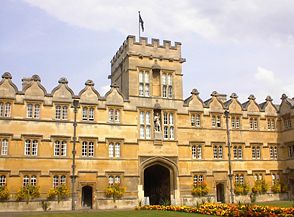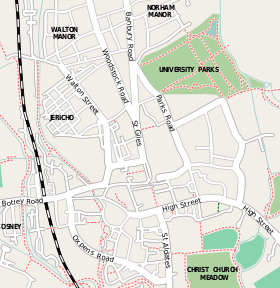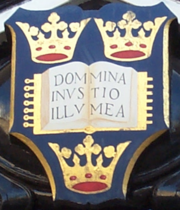University College, Oxford

|
|
||||||||||||
| College name | The Master and Fellows of the College of the Great Hall of the University of Oxford (commonly called University College) | |||||||||||
| Latin name | Magister et Socij Collegij Magnae Aulae Universitatis Oxon. | |||||||||||
| Named after | ||||||||||||
| Established | 1249 | |||||||||||
| Sister college | Trinity Hall | |||||||||||
| Master | Sir Ivor Crewe | |||||||||||
| JCR president | Alex Bulfin | |||||||||||
| Undergraduates | 420 | |||||||||||
| MCR president | Holly Walker | |||||||||||
| Graduates | 144 | |||||||||||
|
|
||||||||||||
 Location of University College within central Oxford |
||||||||||||
| Homepage | ||||||||||||
| Boatclub | ||||||||||||
University College (in full, the The Master and Fellows of the College of the Great Hall of the University of Oxford[1], colloquially referred to as Univ[2]), is one of the constituent colleges of the University of Oxford in England. It is a contender for being the oldest of the colleges of the university, and is amongst the largest in terms of population.
Univ is the best-loved college in either Oxford or Cambridge, measured by the proportion of its old members who offer financial support to the college (28% in 2007, the highest rate in the UK[3]). As of 2006 the college had an estimated financial endowment of £90.5m [4], which makes it slightly better-off than Oxford's college average.
Univ was founded by William of Durham in 1249 (not King Alfred as has been claimed in the past), and until the 16th century was only open to Fellows studying theology. As Univ grew in size and wealth, its medieval buildings were replaced with the current Main Quadrangle in the 17th Century. Although the foundation stone was placed on 17 April 1634 the disruption of the English Civil War meant it was not completed until sometime in 1676.[5]. Radcliffe Quad followed more rapidly by 1719, and the Library was built in 1861. Univ only began to accept female undergraduate students in 1979. It is on the south side of the High Street, between the university's examination schools and Magpie Lane. The Queen's College, Oxford is directly opposite on the north side of the High Street.
Former Master, Lord Butler of Brockwell, was appointed head of an inquiry into the 2003 Iraq War in February 2004. Previous Masters include John Albery, Kingman Brewster, Lord Goodman, Lord Redcliffe-Maud, Arthur Lehman Goodhart, and William Beveridge. In August 2008 Lord Butler was succeeded by Sir Ivor Crewe.
A specially constructed building in the College, the Shelley Memorial, houses a statue by Edward Onslow Ford of the poet Percy Bysshe Shelley — a former member of the college, who was expelled for writing The Necessity of Atheism — depicted lying dead on the Italian seashore. Rumour has it that the sunken area around the statue was once filled with water and live goldfish as a student prank. Another apparently common student prank involving the statue has been to paint his genitalia bright colours; for this reason, the statue's appendage is somewhat smaller than it used to be.
Notable former students and fellows
See also: Former students of University College, Fellows of University College, Oxford and famous alumni
Politicians and civil servants
- Clement Attlee, British Prime Minister
- Sir Jeremy Beecham, Labour politician
- Robert Cecil, a founder of the League of Nations
- Bill Clinton, 42nd President of the United States of America (also Chelsea Clinton, daughter)
- William de Silva, Ceylonese politician
- Andrew George, Liberal Democrat MP
- Philip Hammond, Conservative MP
- Bob Hawke, Australian Prime Minister (Labor)
- Colin Moynihan, Conservative MP
- Robert Reich, former U.S. Secretary of Labor
- David Renton, Baron Renton, MP
- John Scott, 1st Earl of Eldon, Lord Chancellor of Great Britain
- Roger Short, British consul-general to Turkey
- Henry Thrale, MP
- William Weld, governor of Massachusetts
- Sir Rowland Whitehead KC MP
Writers, actors, journalists and broadcasters
- Edwin Arnold, poet, journalist, translator from Hindi
- Paul Foot, journalist and socialist
- Paul Gambaccini, presenter of and writer on pop music
- Maurizio Giuliano, writer, traveller, and United Nations official
- Gordon Honeycombe, actor & playwright
- Armando Iannucci, comedian, writer, satirist and radio producer
- Richard Ingrams, co-founder of Private Eye
- C. S. Lewis, writer, critic
- Peter McDonald, poet
- Cecil Mercer, novelist
- Andrew Motion, British Poet Laureate
- Sir V. S. Naipaul, writer and Nobel Laureate
- Nigel Playfair, actor and theatre manager
- James Ridley, author
- Andrew Robinson, author and former newspaper editor
- Aubrey de Sélincourt, writer & classicist
- Ernest de Sélincourt, literary critic and editor
- Percy Bysshe Shelley, poet
- Peter Sissons, television newsreader
- Charles Sorley, poet
- Stephen Spender, poet and writer
- Rajiva Wijesinha, writer
- Michael York, actor
- Andy Zaltzman, political comedian
- Rajdeep Sardesai, journalist
Scientists, inventors and engineers
- Edmund Cartwright, clergyman and loom-inventor
- Stephen Hawking, physicist
Other
- William Beveridge, socialist economist
- Jonathan Bowen, computer scientist and academician
- G.G. Bradley, noted Latinist, college master
- Lord Butler of Brockwell, civil servant, college master
- Frederick Cornwallis Conybeare, orientalist and religious thinker
- Kenneth Diplock, judge and Law Lord
- David Gill, economist and academician
- Michael Hoban, headmaster of Harrow
- Kenneth Hamilton Jenkin, historian
- Sir William Jones, discoverer of Sanskrit's relationship to Latin & Greek
- Nick Mallett, Rugby player and coach
- Luke McShane, Chess Grandmaster
- Warren Mitchell, actor
- Monier Monier-Williams, linguist
- John Radcliffe, Royal Physician to William & Mary
- Sophie Solomon, violinist, songwriter and composer
- Adrian Stoop, Rugby player
- Sir Peter Strawson, philosopher
- Felix Yusupov, participant in the murder of Grigori Rasputin
- William Stuart, famous Welsh Jazz musician
Other notable connections
Although not member of University College the scientists Robert Boyle (sometime described as the "first modern chemist") and his assistant (Robert Hooke, architect, biologist, discoverer of cells) lived in Deep Hall (then owned by Christ Church and now the site of the Shelley Memorial). The former made a contribution to the completion of University College's current Hall in the mid-17th Century.[6]
Samuel Johnson (author of the A Dictionary of the English Language and a member of Pembroke) was a frequent visitor to the Senior Common Room at University College during the 18th Century).[7]
Grace
Univ. has the longest grace of any Oxford (and perhaps Cambridge) College. It is read before every Formal Hall, which takes place every night except Saturday at Univ.
The reading is performed by a Scholar of the College, the same person doing it for a whole week, and whoever is sitting at the head of High Table (typically the Master, but maybe just the most senior Fellow at the table if the Master is not dining). The Scholar says the lines beginning "SCHOL."; the Fellow says the lines beginning "RESP.".
The Scholar does not need to know it by heart, although it is not unusual for people to do so.
Original version
GRATIARIUM ACTIO IN COLLEGIO MAGNAE AULAE UNIVERSITATIS QUOTIDIE ANTE MENSAM DICENDA.
SCHOL. Benedictus sit Deus in donis suis.
RESP. Et sanctus in omnibus operibus suis.
SCHOL. Adiutorium nostrum in Nomine Domini.
RESP. Qui fecit coelum et terras.
SCHOL. Sit Nomen Domini benedictum.
RESP. Ab hoc tempore usque in saecula.
SCHOL. Domine Deus, Resurrectio et Vita credentium, Qui semper es laudandus tam in viventibus quam in defunctis, gratias Tibi agimus pro omnibus Fundatoribus caeterisque Benefactoribus nostris, quorum beneficiis hic ad pietatem et ad studia literarum alimur: Te rogantes ut nos, hisce Tuis donis ad Tuam gloriam recte utentes, una cum iis ad vitam immortalem perducamur. Per Jesum Christum Dominum nostrum.
RESP. Amen.
SCHOL. Deus det vivis gratiam, defunctis requiem: Ecclesiae, Reginae, Regnoque nostro, pacem et concordiam: et nobis peccatoribus vitam aeternam.
RESP. Amen.
English translation
The College renders the English translation of the Grace thus[8]:
SCHOL. Blessed be God in his gifts.
RESP. And holy in all his works.
SCHOL. Our help is in the name of the Lord.
RESP. Who has made heaven and earth.
SCHOL. May the name of the Lord be blessed.
RESP. From this time and for evermore.
SCHOL. Lord God, the Resurrection and Life of those who believe, You are always to be praised as much among the living as among the departed. We give You thanks for all our founders and our other benefactors, by whose benefactions we are nourished here for piety and for the study of letters. And we ask you that we, rightly using these Your gifts to Your glory, may be brought with them to immortal life. Through Jesus Christ our Lord
RESP. Amen.
SCHOL. May God give grace to the living, rest to the departed; peace and concord to the Church, the Queen and our Kingdom; and to us sinners, eternal life.
RESP. Amen.
Publications
University College Record
The University College Record is the annual magazine sent to alumni of University College, Oxford each autumn. The magazine provides College news, including clubs and societies such as the University College Players and the Devas Club. News about and obituaries of former students are included at the end of each issue.
Previous editors include Peter Bayley, A. D. M. Cox and Leslie Mitchell. The current editor is Dr Robin Darwall-Smith.
Paired Cambridge College
Many Oxford and Cambridge Colleges are informally 'paired' with one another. University College is paired with Trinity Hall, Cambridge.
References
- University College Record, the official annual magazine of University College, Oxford. Issues 1996, 1999, 2001, 2003, 2004.
- ↑ Darwall-Smith, Robin, A History of University College, Oxford. Oxford University Press, 2008. ISBN 978-0-19-928429-0
- ↑ [1]
- ↑ Lord Adonis, Education Minister, 2008
- ↑ Oxford College Endowment Incomes, 1973-2006 (updated July 2007)
- ↑ Darwall-Smith, Robin, A History of University College, Oxford. Oxford University Press, 2008. ISBN 978-0-19-928429-0
- ↑ Darwall-Smith, Robin, A History of University College, Oxford. Oxford University Press, 2008. ISBN 978-0-19-928429-0
- ↑ Darwall-Smith, Robin, A History of University College, Oxford. Oxford University Press, 2008. ISBN 978-0-19-928429-0
- ↑ College Grace
See also
- University College Oxford Boat Club
- University College Players (college dramatic society)
- University Challenge television programme (winners in 1976)
External links
|
|||||||||
